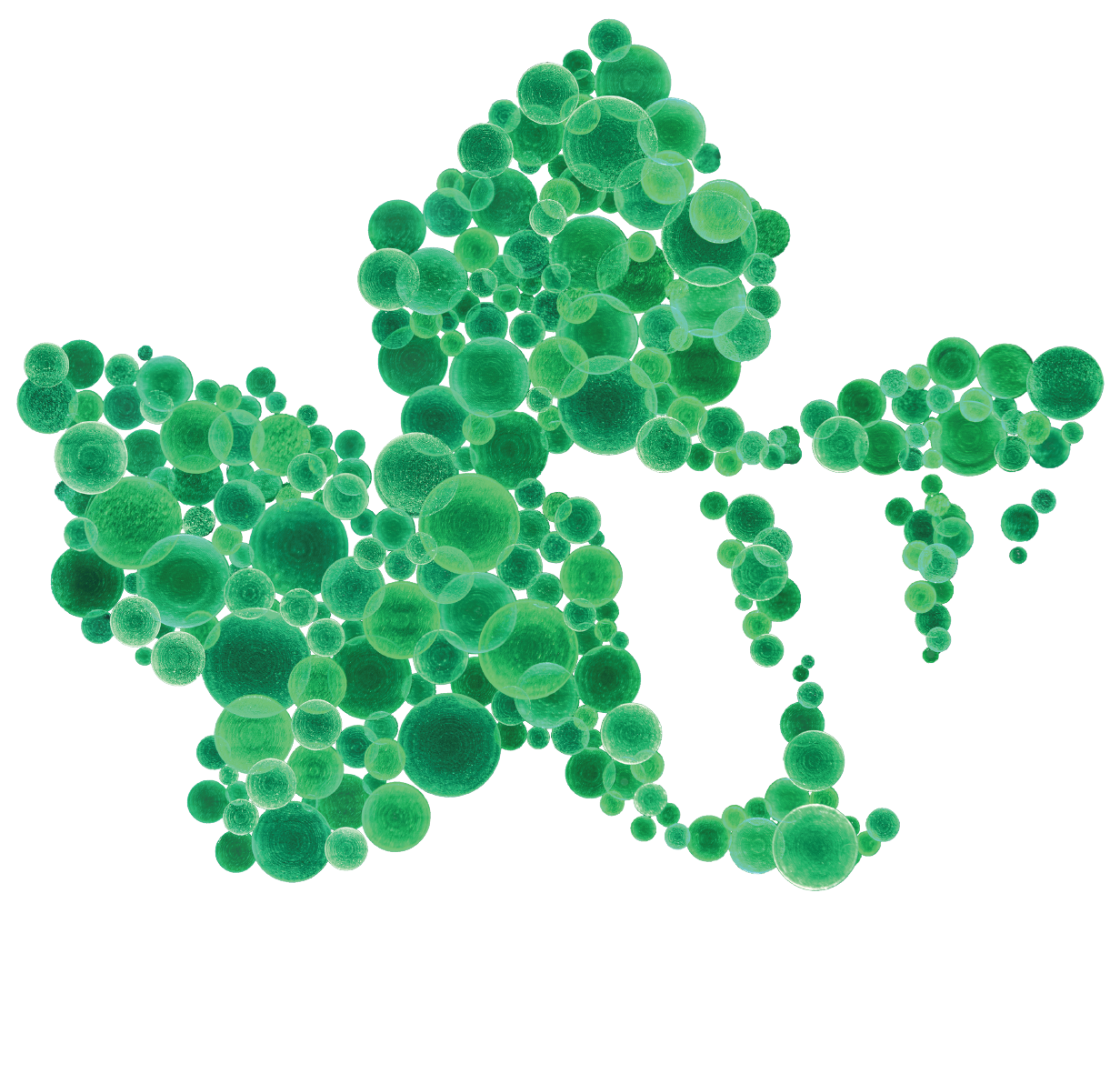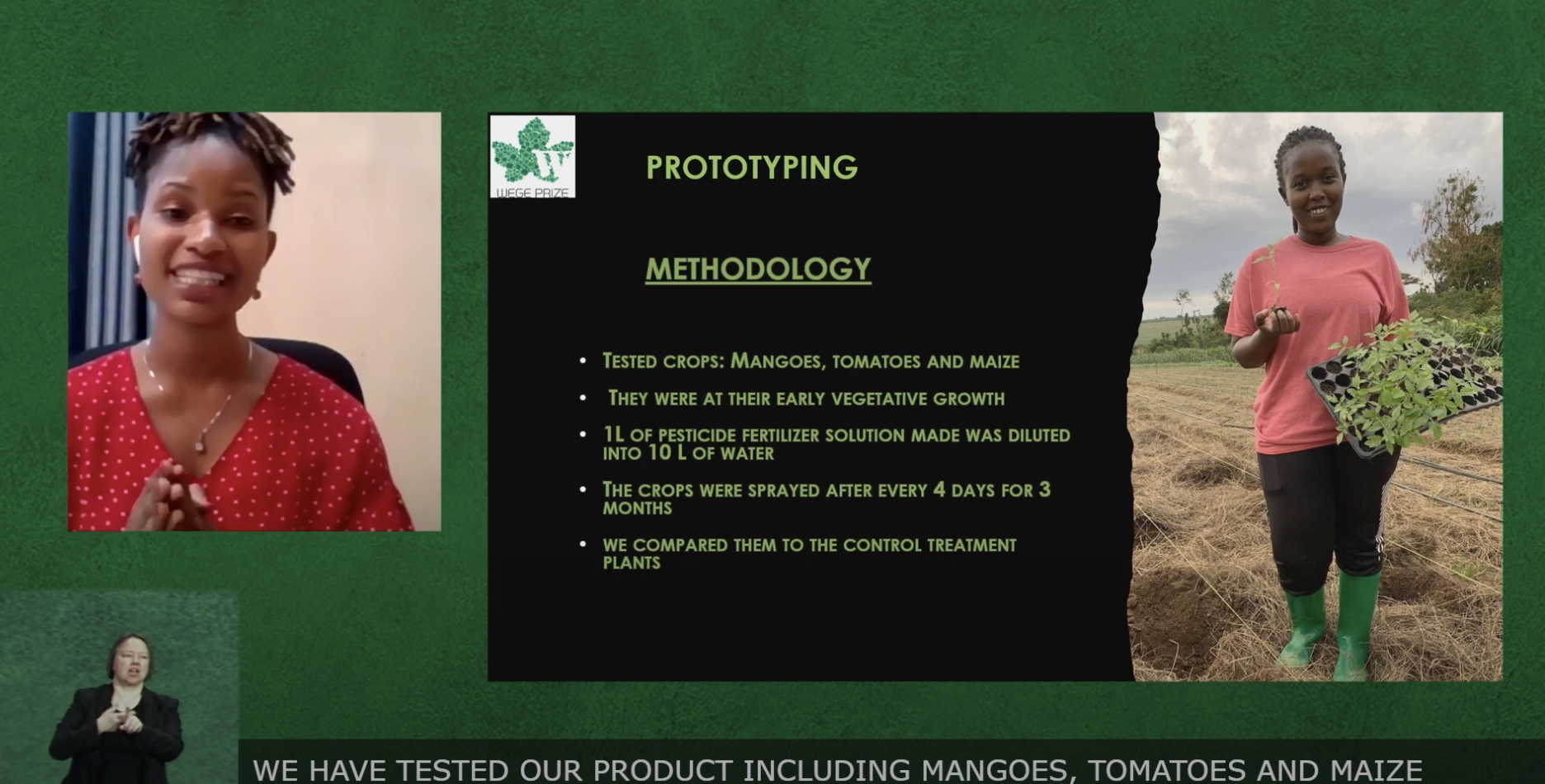Young Winners from Around the World Recognized for Game-Changing Solutions for the Circular Economy
Three victorious teams for Wege Prize 2022 announced, as 2023 competition launches
Five students from Rwanda and United Arab Emirates collaborate to win 1st Prize
and $30,000 with innovative organic pesticide-fertilizer to replace chemical products
Grand Rapids, Michigan, USA, June 15, 2022 — Offering new ideas to positively impact the world, three university student teams have been named the winners of Wege Prize 2022, an international student design competition organized by Kendall College of Art and Design of Ferris State University (KCAD). Sharing the competition’s largest purse ever, totaling $65,000 (USD), the three teams are advancing solutions for today’s “wicked problems” such as hunger, waste, pollution and climate change.
Now in its ninth year, Wege Prize has identified winning teams in the uniquely collaborative competition involving students studying in seven countries on three continents. They emerged over the course of the nine-month-long multiphase competition from a global field of participants representing almost 100 areas of academic study at 70 universities and colleges from an astounding 29 countries.
Through a immersive process transcending fields of study, cultures, and institutional boundaries, Wege Prize teams are inspired to reframe normal ways of producing and consuming. The teams engage in intensive research, testing, networking and prototyping, with direct feedback from the competition’s panel of expert judges. “In this way, the teams create new products, services, business models, and solutions cutting through systemic issues — while also helping power a transition to a regenerative, circular economy,” says Gayle DeBruyn, KCAD professor and Wege Prize organizer.
The winners of Wege Prize 2022 are:
3rd Place ($10,000): AquaPro, a super-efficient aquaponics system to grow fish and vegetables.
2nd Place ($20,000): Neocycle, a plan to recycle rare-earth elements from electronics waste.
1st Place ($30,000): Green Promoters, creating organic pesticide fertilizer to replace chemicals.
Two other student teams, Robust and SCUP Aquaculture, each received $2,500 awards as finalists.
Wege Prize, the international student design competition to create circular solutions for “wicked problems,” is a widely acclaimed and globally recognized competition serving as an agent of change for these disruptive concepts — and lofty student ambitions. It has drawn participants from the best academic programs at leading universities worldwide, from U.S. Ivy League schools to national science and technology universities in India, Ghana, China, Japan and Chile.
“The circular economy isn’t all worked out yet, and that's where these student teams come in,” said Jo Williams, a Wege Prize judge and U.K.-based circular economy learning consultant who also works for the Ellen MacArthur Foundation. “You're the ones who will be implementing this, so you can be part of that conversation, part of that journey, in helping to formulate what the circular economy really is.”
The solutions Wege Prize teams create have gone on to make real-world impact. The 2019 finalist Rutopia’s eco-sensitive tourism concepts, covered by top editors at Forbes, gained funding and support. Others like 2020 Wege Prize winner Hya Bioplastics and the 2021 team The Chilensis have advanced to prestigious business incubators that lay the groundwork to implement their prize-winning ideas.
“We are so proud of our winners and of every participating Wege Prize team, and we are grateful for our expert judges and their open-hearted dedication to the teams,” adds KCAD’s DeBruyn. “With climate change, supply and energy bottlenecks and so many other pressing global issues, the world needs more people who can work across boundaries, and solve problems with circular solutions.”
Read more about the winning teams below, and see their full project summaries on our website. Details on the next edition, Wege Prize 2023, will be revealed in the coming weeks on wegeprize.org.
Wege Prize is made possible through the continuing financial support of The Wege Foundation and KCAD, opening these unique opportunities for undergraduate, graduate, and post-graduate students around the world — and helping take strides toward a greater circular economy.
About the Winners of Wege Prize 2022 — Game-Changing Sustainable Solutions for the Circular Economy of the Future
Marie Merci Uwimbabazi presenting for Green Promoters.
1st Place ($30,000) – Green Promoters
Institutions represented: Davis College (Rwanda), Rwanda Institute for Conservation Agriculture, United Arab Emirates University
Disciplines represented: Conservation Agriculture, Electrical Engineering, and Entrepreneurship
Presentation Video: https://youtu.be/80H5XQAG81A
What if we could reduce the negative effects of chemical fertilizers and pesticides by producing a new blend of organic pesticide and fertilizer, together?
The team Green Promoters created a way to reduce and eliminate the effects of the chemical pesticides and fertilizers by developing and marketing their own organic pesticide-fertilizer, called EZA Two-in-One. The product can be used as a pesticide and fertilizer at the same time, and it is shown to be environmentally friendly, safe, and affordable. The new product and processes benefit the challenges of waste and idle resources in various community, while creating new opportunities. The introduction of EZA Two-in-One promises to reduce the costs of imported inputs, while also promoting safety in agricultural production
“Chemical pesticides and fertilizers are dangerous to the farmers, consumers and environment,” according to the team. “At global scale, they are also leading to critical and long-term health impacts”
Green Promoters notes recent United Nations statistics showing about 385 million cases of acute poisonings annually, with approximately 11,000 deaths. This means that 44% of the global population working on the farms are poisoned every year. “This is a serious issue, especially in Rwanda, where 70% of the population depends on agriculture,” they say, citing 2022 data from the U.N.’s Food and Agriculture Organization. “Most farmers are not skilled in the proper use of agrochemical inputs, and they lack protective equipment,” adds Green Promoters. “This increases contamination risks, and has led to extreme environmental degradation and human and animal health hazards.”
Green Promoters developed a combination organic fertilizer and pesticide from a mixture of eight materials including invasive plants and organic wastes found in their region. The production concept for EZA Two-in-One takes advantage of natural resources such as Tagetes minuta, the pencil cactus Euphorbia tirucalli, Lantana camara, chili waste as well as garlic and tobacco. Their essential ingredients act as pesticide, with the addition of chicken manure and cow urine as fertilizer nutrients. This resulting liquid product is highly effective for sustainable farming — performing better than standard chemical pesticides and fertilizers.
What the judges said: “The wicked problems of food and human soil contamination are systemic and worldwide. This solution addresses these problems with a low-labor and low-cost approach that protects biospheres. In tackling some of the most challenging issues facing all life on earth, the proposal by Green Promoters has addressed them very creatively.” — Bill Stough
Subasthika Thangadurai presenting for Neocycle
2nd Place ($20,000) – Neocycle
Institutions Represented: University of Calgary (Canada)
Disciplines Represented: Bioinformatics, Biological Sciences, Chemical Engineering, and Cellular, Molecular and Microbial Biology
Presentation Video: https://youtu.be/0FcwrvOEG1A
What if we could circulate a supply line for all rare-earth elements and reverse the adverse impacts of rare earth mining while providing a path of reintegration for critical materials?
Rare earth elements, known as REEs, are ubiquitous in everyone’s day-to-day lives and essential in many modern technologies, from personal laptops to catalytic converters in vehicles. As the demand for rare-earth elements has been growing exponentially, it is clear that the current supply chain cannot sustain global demand. Neocycle aims to utilize electronic waste, a massively untapped source of REEs, to develop a novel and sustainable synthetic biology approach for circular REE extraction, recovery, and usage.
Says the team, “Currently, REEs are sourced through mining — an environmentally harmful, time-consuming, and expensive process. In the limited instances where REEs are recycled, it is done using processes such as hydro- and pyro-metallurgy, both of which release toxic byproducts. These methods also require complex chemical steps, resulting in poor working conditions.
Neocycle’s solution offers an alternative with numerous competitive advantages over conventional REE recovery. Customers will obtain increased value from waste processing, and benefit from a safer, more energy-efficient, and more eco-friendly approach — all while maintaining a similar recovery rate.
With their viable and long-term solution to the REE scarcity problem, Neocycle promotes the formation of a circular economy, where end-of-life products are repurposed as a new source of precious materials. Currently, over 2.7 metric tons of raw ore are required to produce just 1 kilogram of the REE neodymium, with a heavy environmental cost of 247 kilograms of CO2. It’s an energy-intensive and complex process with numerous steps of physical and chemical separation.
Instead, Neocycle's biology-based REE-cover system captures REEs from a much more sustainable source, bypassing environmentally damaging mining practices. Unlike traditional mining, by manually isolating e-waste components high in specific elements, the REE-cover system can produce a consistent concentration of certain REEs. This process enables a more predictable output with less operational complexity.
What the judges said: “What a problem we’ve got with e-waste, and this team has come up with an idea to solve it that could have legs, and that’s very exciting. We were very impressed with the size of problem, and that the team has already begun building relationships with local recycling facilities—that will be crucial to scalability. Recycling rare earth elements can be technically difficult, so Neocycle’s success thus far is highly commendable.” — Colin Webster
Joshua Addai Amoah presenting for AquaPro
3rd Place ($10,000) – AquaPro
Institutions Represented: Universidade Eduardo Mondlane (Mozambique), University of Maryland Global Campus (United States), Chengde Medical University (China), Kwame Nkrumah University of Science and Technology (Ghana), University of Ghana
Disciplines Represented: Medicine, Petroleum Engineering, Psychology and Physics
Presentation Video: https://youtu.be/l0huh7mQftA
What if we could reduce water pollution with an innovative aquaponics system to grow fish, vegetables, and duckweed?
The AquaPro team solves the wicked problem of water pollution with an innovative aquaponics system that combines the recirculation of aquaculture with plant culture in the absence of soil (hydroponics). Their team focuses on growing fish, duckweed, and vegetables, where high-nutrient water is circulated from the fish to the crops. The crops then absorb the nutrients in the circulated water in order to grow new products without soil or excessive fertilizer application. The new duckweed, in turn, feeds the fish, significantly reducing the use of external fish feed. Waste from human consumption of vegetables and fish is recirculated back into the aquaponics systems as a compost liquid to supplement crop growth. In this way, the cycle of nutrients is constantly flowing from fish to plants to humans.
“In many countries, the biggest source of water pollution is agriculture,” according to AquaPro, citing U.N. FAO data. “Yet worldwide, the most common chemical contaminant found in groundwater aquifers is nitrate from farming. Farms discharge large quantities of agrochemicals, organic matter, sediments and saline drainage into water bodies.” To solve this wicked problem, AquaPro’s process removes inorganic fertilizer application from the cultivation of vegetables as it reduces water usage by up to 90% and maximize crop yield. The plan also reduces land usage and eliminates massive sources of waste — maximizing resources in many interconnected ways.
Most important, AquaPro’s concept reduces the pollution associated with agriculture. The sources of pollutants are either eliminated — such as the chemicals used in farming — or they are kept in a loop of circular reuse, as with the uneaten fish feed and their excreta. In the process, the team offers a glimpse of an unusually sustainable approach to tomorrow’s aquaponics farming.
What the judges said: ”We’ve seen similar kinds of solutions in the past, but none as well-developed and thoughtful. When it comes to food production — and especially healthy food production — we really appreciated seeing a solution that was absolutely circular at its core. The use of appropriate and local technology is right on the mark, and gave the judges confidence that this solution could be implemented in the short term and on a broader scale down the road. We loved the focus on cultural resources and food, on using solar power, and on making such effective use of space and local resources.” — Nathan Shedroff




